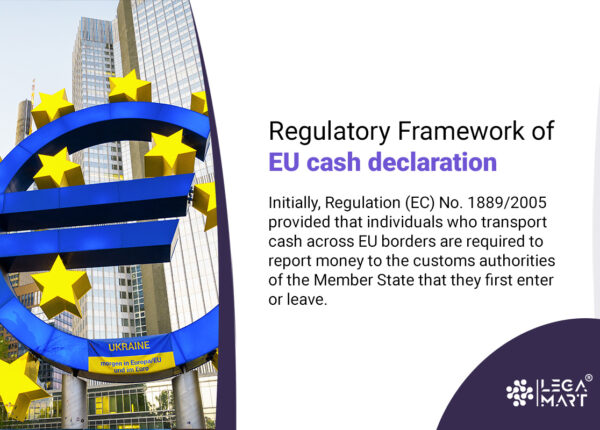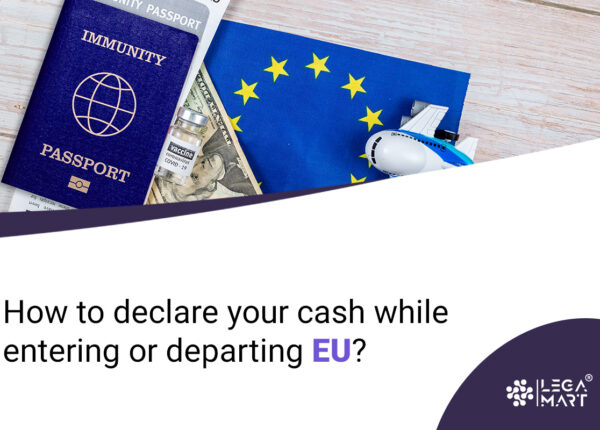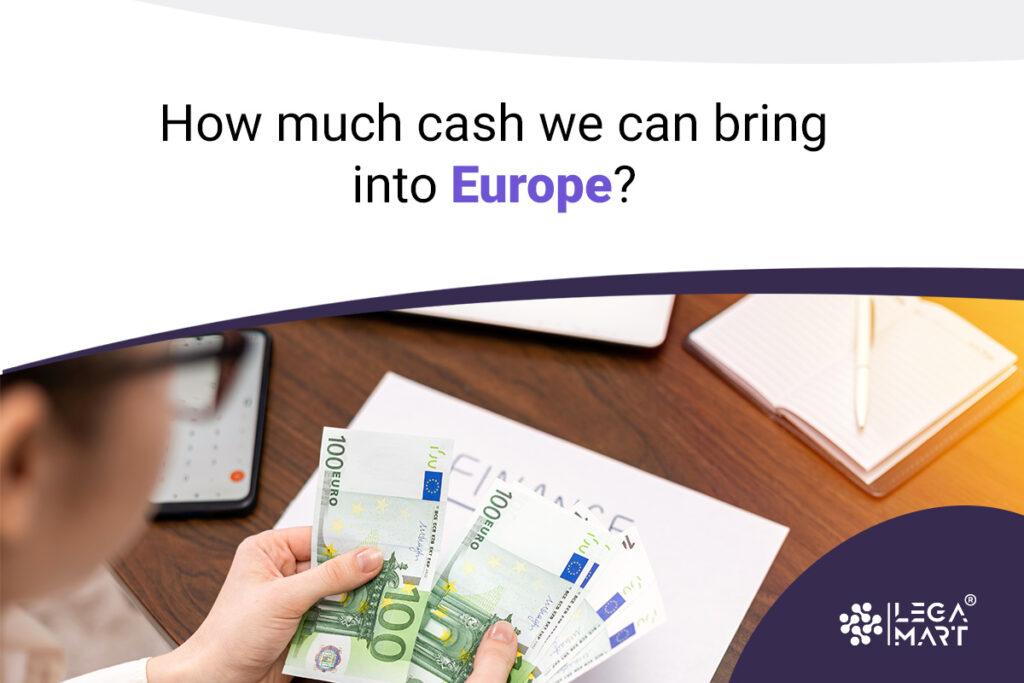- Introduction
- What is the EU cash declaration?
- How much cash we can bring into Europe?
- Regulatory Framework of EU cash declaration
- Declaring cash we can bring into or out of the EU
- What kinds of money are required to be declared?
- What information is needed, and how is the declaration to be made?
- Where should the declaration be submitted?
- What happens after all the information is provided?
- What transpires if the information raises suspicion of money laundering or the funding of a terrorist organisation?
- What repercussions might travellers who misrepresent or omit information about the amount they’re carrying incur?
- How to declare your cash while entering or departing EU?
- Conclusion
- Frequently asked questions
Introduction
The purpose of the mandatory declaration of the cash we can bring into Europe at the external European Union (hereinafter referred to as ‘EU’) borders and of the customs checks is to stop cash movements more from illegal sources and to pursue cases of an influx of criminal act proceeds into the EU (also known as the prevention and pursuit of money laundering).
To stop terrorism from being funded, it is also important to identify anyone associated with terrorist groups transporting large sums of money and confiscating it. Yet, the pertinent issue which arises is how much money you can fly within Europe and when it is necessary to declare the amount you are carrying into or out of the EU. Also, the travellers are posed with the issue of how to declare the cash and the legal consequences of non-declaration of amount brought into the EU.
What is the EU cash declaration?
A cash declaration is a document submitted by a traveler when entering or leaving EU territory or by a shipper when sending packages to a destination, which discloses the ownership of currency being transported.
How much cash we can bring into Europe?
The need to file a declaration and customs inspections does not impede the free flow of capital. Even in the future, it can travel with a limitless amount. All travellers entering or leaving EU territory are required to complete a cash declaration when carrying €10,000 or more (or equal in other currencies, bonds, shares, or travellers’ cheques) as part of the EU’s efforts to combat money laundering and the financing of terrorism, such declaration can be conveniently done through an electronic signature on the declaration form.
Customs officials have the authority to inspect travellers, their belongings, and their mode of transportation. Additionally, they have the authority to hold undeclared money. The declaration must be submitted in writing to the customs office in Germany. Article 3 of Regulation (EC) No 2018/1672 of the European Parliament and the Council on October 28, 2005, which is applicable across the European Community and not just in the Federal Republic of Germany, requires travellers to abide by the requirement to disclose cash. The violation of the obligation is a crime that carries a fine.
The customs administration in Germany has to conduct customs checks to ensure that the requirement is being followed. A significant fine of up to one million euros may be assessed for either failing to declare money or declaring it in error. The carrier is not deemed to have fulfilled their duties and is subject to penalties under the applicable national law if inaccurate or insufficient information is given or the cash is not made available for control.
According to Article 9 of Regulation (EU) 2018/1672, information and personal data must be collected, handled, and provided to the Financial Intelligence Unit (FIU) by the competent authorities. The information will also be made available to the authorities included in Articles 10 and 11 of that Regulation in the situations described above. The controllers of the personal data obtained are the competent authorities of the Member State where the declaration is submitted, and they are required to store the data, following Article 13 of Regulation (EU) 2018/1672, for at least of five years. The only purposes for which personal data is processed are to prevent and combat criminal activity.
Regulatory Framework of EU cash declaration

Initially, Regulation (EC) No. 1889/2005 provided that individuals who transport cash across EU borders are required to report money to the customs authorities of the Member State that they first enter or leave.
On 3rd June 2023, Regulation (EU) No 2018/1672 came into effect, which repealed Regulation (EC) No. 1889/2005. The following are salient features of Regulation (EU) No 2018/1672 –
- Customs authorities are required to document information on cash below the reporting threshold when there are indications that the money is connected to criminal activity.
- Extension of the definition of “cash” to include banknotes and coins; Bearer-negotiable instruments such as cheques, promissory notes, or money orders; gold coins with a gold content of at least 90%; and gold bars, gold nuggets or clusters with a gold content of no less than 99.5%
- Under specific conditions, money may be temporarily held in detention.
- A cash disclosure declaration may be required by customs authorities for unaccompanied cash valued at €10,000 or above. This includes money sent by post, freight, or courier into or out of the EU.
On the other hand, Customs Act 2015, updated on 22nd November 2021, provides penalties for non-compliance with the regulations. For example, Section 42(12) (a) and (b) Customs Act 2015 provides that; An individual who fails to provide an accurate and comprehensive declaration or fails to present cash for inspection commits a crime and may be subject to a fine of €5,000 upon summary conviction.
Additionally, Section 42(13) Customs Act 2015 provides that if an individual fails to provide an accurate and comprehensive disclosure declaration regarding unaccompanied cash, it constitutes an offence, and they may face a fine of €5,000 upon summary conviction.
Declaring cash we can bring into or out of the EU
Any natural person entering or departing the EU with cash valued at least €10,000 must notify that amount to the appropriate authorities of the Member State through which they are doing so. Anyone who enters or exits the EU via land, air, sea, or train is considered to be a natural person.
The declaration must include the name of the company if the person is transporting cash on behalf of a legal body, such as the employer. When travelling in a group, each individual is still subject to the € 10,000 cap. Additionally, minors, through their parents or legal guardians, are required to report their money, as are mentally incapacitated individuals or protected adults through their legal representation. It is crucial to proactively approach and ask for assistance from the relevant authorities at the point of entrance or exit of the EU if you are unsure whether you must declare or not.
What kinds of money are required to be declared?
Here, ‘cash funds’ are referred to as ‘cash’ or ‘traveller’s checks’, ‘money orders’, ‘promissory notes’, ‘shares’, ‘debentures’ and ‘due interest warrants’ (so-called coupons).
- Currency is defined as banknotes and coins currently in circulation as a form of exchange, have previously been in circulation as a form of exchange, and may still be exchanged for current-issue banknotes and coins through financial institutions or central banks.
- Bearer-negotiable instruments can be presented instead of cash and allow the owner to claim a sum of money without having to verify their identity or right to it. The following types of instruments fall under this category:
a) traveller’s cheques.
b) cheques, promissory notes, or money orders that are either in bearer form, signed but without the payee’s name, endorsed without restriction, made out to a fictitious payee, or otherwise in such a way that title thereto passes upon delivery.
- Bullion, such as bars, nuggets, or clusters with a gold content of at least 99.5%, is employed as a highly liquid store of wealth, as are coins with a gold content of at least 90%.
What information is needed, and how is the declaration to be made?
A written declaration of the cash that we bring to into Europe must be made. Declaration forms can be obtained at the site of the customs administration at www.zoll.de as well as from customs officials. You must provide your personal information, travel plans, and mode of transportation if you have cash valued at € 10,000 or more. You must also declare exactly how much money you are carrying, where it came from, what it will be used for, who the owner of the cash is, and who the payee is. It is vital to fill out the form issued by the customs authorities thoroughly and legibly.
Where should the declaration be submitted?

The customs office where you are entering or departing the EU’s territory must receive your written declaration if you are carrying cash worth at least € 10,000.
Travellers who take planes, trains, or ships are subject to additional regulations:
Air travellers entering the EU through an international Community airport (such as Frankfurt Airport) must present their written declaration at the red customs exit designated for travellers with declared items. Travellers must declare their cash at the appropriate designated customs office at the airport before departing the territory. Anyone entering or departing the EU via a non-international Community airport (such as a private airport) must submit their declaration to the customs office in charge of the airfield they utilised.
During the customs checks on the train, rail travellers entering or leaving Switzerland must report their cash in writing. Passengers will have the chance to fill out the necessary forms that the customs agents will have on hand, allowing them to fulfil their obligation to declare.
Unless a customs inspection has already been conducted on the ship, travellers entering the EU by ship must submit their written declaration to the customs office in charge of the customs landing stage where the ship has berthed. In this scenario, the customs officers will have an assortment of the necessary paperwork on hand and will provide travellers with the chance to complete them to fulfil their requirement to declare. The customs office in charge of the customs landing stage where the ship has berthed must receive a written declaration of all monies belonging to travellers departing the EU’s maritime zone.
What happens after all the information is provided?
You can take your money with you and continue travelling without hindrance if the information provided is comprehensive and coherent and does not raise suspicions regarding money laundering or the sponsorship of terrorism. You will receive the second copy of the declaration back, including customs’ endorsement and signature. It is advised that you maintain this copy with you throughout your journey.
What transpires if the information raises suspicion of money laundering or the funding of a terrorist organisation?
The money will be held in customs custody while the situation is investigated if there is any reason to mistrust the information provided by the traveller or if there are any other reasons to suspect money laundering or the sponsorship of a terrorist organisation.
What repercussions might travellers who misrepresent or omit information about the amount they’re carrying incur?
Travellers who fail to declare or falsely declare any cash they are carrying run the danger of paying a steep fine of up to one million euros. The Customs Administration Act’s Section 31b is the legal foundation for the imposition of the fine penalty.
How to declare your cash while entering or departing EU?

Natural persons entering or departing the EU should be required to declare any cash to stop money laundering and terrorist financing. The obligation should be subject to a threshold of €10,000 in order to avoid unreasonably restricting free movement or overburdening persons and authorities with administrative formalities. It ought to be applicable to transporters who carry such quantities in their possession, in their luggage, or on the mode of transportation they use to cross external borders.
They ought to be obligated to make the money available to the appropriate authorities for control and, if necessary, to make it available to those authorities in person. It is important to understand that professional carriers who transport persons or commodities are not included in the definition of ‘carrier’.
The competent authorities should have the authority to require the sender or the recipient, or a representative thereof, to make a disclosure declaration, systematically or on a case-by-case basis, in accordance with national procedures, with regard to movements of unaccompanied cash, such as cash entering or leaving the Union in postal packages, courier shipments, unaccompanied luggage, or containerized cargo.
Such disclosure should include a variety of components that aren’t included in the typical customs documentation, like shipping documents and customs declarations. These components include the money’s source, final destination, economic provenance, and intended purpose. The same threshold should apply to the requirement to declare unaccompanied cash as it does for cash carried by carriers.
The competent authorities of the Member State through which unaccompanied cash worth at least € 10,000 is entering or leaving the Union may demand that the sender or recipient of the cash, or a representative thereof, as the case may be, submit a disclosure declaration within a 30-day window.
The following information must be included in the disclosure declaration:
a) The declarant’s full name, and contact information, including address, date of birth, nationality, and identification document number;
b) The owner of the cash’s full name, contact information, address, date of birth, nationality, and identification document number, if the owner is a natural person, or full name, contact information, including address, registration number, and, where available, the VAT identification number;
c) the sender, who must provide their full name, address, date of birth, nationality, and identification document number if they are a natural person; or their full name, address, registration number, and, if applicable, VAT identification number if they are a legal person;
d) the intended recipient, who must provide their full name, address, date of birth, nationality, and identification document number;
e) The kind and value of the cash;
f) Where the cash came from economically; and
g) The cash’s intended purpose.
Conclusion
The filing of the cash declaration is free of cost. The declaration of the cash we can bring into Europe is necessary to combat the issue of terrorism and money laundering. The person who fails to make a correct declaration in respect of accompanied cash or fails to make cash available for control when requested to do so by customs or who fails to make a correct and complete disclosure declaration in respect of unaccompanied cash commits an offence under Section 42 of the Customs Act, 2015 and is subject to a summary conviction and a fine of €5,000.
That’s a wrap for this article. If you are considering relocating to any of the European countries, we recommend that you consult an immigration lawyer about your options and other essential requirements for a hassle-free move.
Frequently asked questions
What forms of cash need to be declared?
All forms of cash need to be declared, including banknotes, coins, traveller’s checks, and money orders.
Do I need to declare cash if I am carrying it for business purposes?
Yes, provided additional information about the nature of your business and the purpose of the cash is provided.
What happens if I fail to declare cash when entering or leaving Europe?
Failure to declare the amount of money may result in penalties such as fines or confiscation of the cash, or even criminal charges.
If you are planning to move to any of the European countries, be it Norway or other parts of Europe, we recommend that you consult an immigration lawyer about your options and other essential requirements for a hassle-free move.
Uncover the steps and procedures for immigration to different nations, with a focus on US to Portugal, in Legamart’s insightful article.




